July 16, 2015
Edited by David Sanders
Specimen Days
1730 – Elijiah Fenton, poet, dies.
1736 – Thomas Yalden, poet/fable writer, dies.
1857 – Pierre-Jean de Baranger, poet, dies.
1890 – Gottfried Keller, novelist/poet, dies.
1923 – Louis M A Couperus, poet/writer (Books of Small Soles), dies at 60.
1943 – Reinaldo Arenas, Cuban poet (d. 1990), is born.
1949 – Vyacheslav Ivanov, Russian poet (b. 1866), dies.
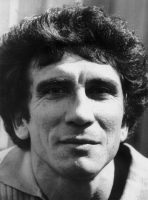
I am that child of always
before the panorama of imminent terror,
imminent leprosy, imminent fleas,
of offenses and the imminent crime.
I am that repulsive child that improvises
a bed out of an old cardboard box and waits,
certain that you will accompany me.
—from “My Lover the Sea” by Reinaldo Arenas (1943–1990)
“I am that child of always / before the panorama of imminent terror,” —from “My Lover the Sea” by Reinaldo Arenas
World Poetry
Reading Poetry Written by Jihadists Could Shed New Light on Extremism
What do jihadists do when they’re not plotting or perpetrating acts of terror? Should we care? It’s a question that has been raised recently by various scholars studying extremist movements; and the consensus appears to be that yes, we should. As the Norwegian political scientist Thomas Hegghammer put it in a lecture earlier this year, “the non-military activities of terrorist groups can shed important new light on how extremists think and behave”. The nature of these non-military activities are surprising. Heghammer continued: “Look inside jihadi groups and you’ll see bearded men with kalashnikovs reciting poetry, discussing dreams, and weeping on a regular basis.”
Reading poetry written by jihadists could shed new light on extremism.
Recent Reviews
Review: Looking Inward in Poetry Books From Ron Padgett and Nick Flynn
by Jeff Gordimer
These days we’re taught to be leery of the man-child, that sloppy, skateboard-toting guy of a certain age who seems determined to cling to his concert T-shirts and skillfully avoid adulthood for as long as he can. Among male poets, though, the preservation of a stubborn streak of boyishness can feel like an advantage, at least when it comes to coaxing readers into the backyard soap-bubble of a poem. It might even be a job requirement.
The Persistence of Litmags
by Stephen Burt
Why on Earth would you start a literary magazine? You won’t get rich, or even very famous. You’ll have to keep your day job, unless you’re a student or so rich you don’t need a day job. You and your lucky friends and the people you hire—if you can afford to pay them—will use their time and energy on page layouts, bookkeeping, distribution, Web site coding and digital upkeep, and public readings and parties and Kickstarters and ways to wheedle big donors or grant applications so that you can put out issue two, and then three.
That Peculiar Almost Affirmative
by Jonathan Farmer
Invitingly small, little more than pocket-size—the pocket in some cargo pants, perhaps—Colm Tóibín’s On Elizabeth Bishop is, at different moments and to varying degrees, a primer and a personal reflection; an introduction to Bishop and a consideration of a poet, Thom Gunn, who neither influenced nor was influenced by her; thoroughly beautiful and slightly pedantic; careful to see the poems in all their complexity and too willing to boil their virtues down to a single effect; an easy read informed by voluminous reading; too little and too much. I enjoyed most of its 199 narrow pages and was awed by many, yet I would be wary of recommending it to someone because I can’t say with any consistency whom (or what) it’s for.
Late Indulgences: John Ashbery’s Breezeway
by James Gibbons

A few months ago in the New Yorker, essayist John McPhee recalled an exchange with his editor at Playboy in 1970, Arthur Kretchmer, about whether to remove a certain reference in a draft he’d submitted — an adaptation of the phrase “port out, starboard home,” an apocryphal etymology for the word “posh” — because it would fly far above the heads of all but the tiniest fraction of its audience. McPhee pleaded, Kretchmer yielded, and Playboy’s readers were momentarily puzzled. The anecdote makes me think of John Ashbery, and not only because “port out, starboard home” is the sort of phrase one encounters in an Ashbery poem, perhaps even as its title. In an interview given just before the publication of his new collection Breezeway, Ashbery recounts conceding to critic Harold Bloom that a reference to one Mr. Salteena in the book’s opening poem will be almost universally opaque: “Probably one in four million people knows who Mr. Salteena is.” Bloom, annoyingly, announces himself to be that single nodding head among four million blank stares.
The Prose Eliot
by William H. Pritchard
Over the past two months, I have been undergoing one of the more significant reading experiences of my life, the perusal of T. S. Eliot’s complete prose from the first twenty-one years of his writing career. Eliot died in 1965, so these pages constitute a major recognition, after fifty years, of his contribution. The general editor is Ronald Schuchard, and anyone familiar with his edition of Eliot’s Clark lectures of 1926 (The Varieties of Metaphysical Poetry, 1993) will be unsurprised at the extraordinary fullness with which these two large volumes are annotated.[1] The general editorial introduction to the volumes tells us that the notes are intended to “enhance and clarify” Eliot’s “highly referential prose.” The magnitude of this editorial task was enormous, since at the beginning of the present century more than 700 pieces of the prose were uncollected, nor were there any critical editions of works published in his lifetime, the Clark lectures being the exception.
John Ashbery conceded to critic Harold Bloom that “only one in four million people” would understand his reference to one Mr. Salteena.
Broadsides
The Art of Concision: A Look at Haiku
Many English speakers first encounter the haiku in school, learning that it is a poem of 17 syllables, divided into lines of 5, 7, and 5 syllables. And Japanese people are also likely to immediately think of 5-7-5 on hearing the word “haiku.” But an immediate visual difference is that while haiku are conventionally written in three lines in English, they appear as just one line in Japanese. This would originally have been written vertically (top to bottom), but is now commonly seen horizontally (left to right) as well.
In Search of Tamil Nadu’s Poet-preachers
A millennia-old tradition of sacred Tamil verse is at risk
by William Dalrymple
The hotel stood high on a hill above the Tamil temple town of Madurai. It was a former planter’s house — all shady verandas, wooden balconies and teak floors — and from the terrace you had a fine view over the tops of the eucalyptus and casuarina trees to the wooded slopes of the estate.
Beyond, lay the four towering gopura gateways that guarded the entrances to the temple of Meenakshi at the centre of the town. At dawn, the gopuras had stood out in the first light, rising defiantly above the mist swirling in from the river. But now, only two hours later, the sky had darkened, casting the towers into shadow; a storm was brewing, and thunderheads were rising rapidly over the paddy to the south. By the time Araiyar Srinivasan arrived for breakfast, the palmyra palms were rattling in the wind, and the first drops of rain were falling fast.
A millenia-old tradition of sacred Tamil verse is at risk.
Drafts & Fragments
32 Failed TV Pilots Based On Classic Poems
Curated by Dan O’Brien and members of the writers’ room of Playing House Season 2 on USA Network, co-creators Jessica St. Claire & Lennon Parham, and show-runner Anthony King
Byron, George Gordon Noel, Lord
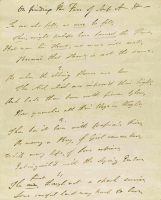
ON FINDING THE FAN OF MISS A[NNE] H[OUSON]
Estimate 10,000 — 15,000 GBP
autograph manuscript poem ("In me who felt, as once he felt … Its former warmth around another"), 20 lines in five stanzas, a fair copy with two corrections, 2 pages, 4to, 1807, annotated in the hand of Elizabeth Pigot ("Copied for Mr Moore Jany 29th 1828"), in a collector's slipcase and red morocco backed box with armorial gilt stamp
Five stanzas by Lord Byron annotated in the hand of Elizabeth Pigot were found recently in a collector’s slipcase.
Poetry In the News
James Tate, Decorated Poet of the Ordinary and Extraordinary, Dies at 71

James Tate, who planned to be a gas station attendant but changed course in college when he discovered that he could write poetry, the art form that occupied him for the rest of his life and for which he received the highest honors in American letters, died July 8 in Springfield, Mass. He was 71.
The Forgotten Man Behind William Carlos Williams’s ‘Red Wheelbarrow’

For decades, much has depended on his red wheelbarrow, streaked with rain, next to some white chickens, even if no one has known — or perhaps even wondered — exactly who he was. But now, the owner of the humble garden tool that inspired William Carlos Williams’s classic poem “The Red Wheelbarrow” will finally get his due.
Poetry Foundation Has Interim Head: Henry Bienen

Henry Bienen might have been a poet. Or so the former Northwestern University president said in announcing his appointment as interim president of the Chicago-based Poetry Foundation. “I am a lifelong reader and greatly appreciate the literary arts. I started out in undergraduate school at Cornell University thinking poetry might be a vocation of sorts for me. The great poet W.D. Snodgrass disabused me of that idea!" Bienen wrote in a press release.
James Tate passed away July 8 in Springfield, Mass.
New Books
Crossing Over: Poems by Priscilla Long
[Paperback] University of New Mexico Press, 80 pp., $17.95

Long's work begs to be read aloud in order to savor the rich language and rhythm she instills in each poem. She explores the beauty of specific bridges while employing them as a metaphor for crossings to death (a sister's suicide), eros, and art. Part elegy, the book also explores living, remembering, and celebrating.
Hidden Water: From the Frank Stanford Archives by Frank Stanford
[Paperback] Third Man Books, 200 pp., $17.95
"“The big event in poetry for 2015 will likely be the long-awaited resurrection of Frank Stanford, a legendary badass from Arkansas, much of whose poetry has been unavailable since his suicide at the age of 29 in 1978… Stanford was a hell of a metaphor-maker and simile-slinger, and could cast a spell of extreme intensity with a flick of his wrist.”—NPR.org
The Collected Letters of Robinson Jeffers, with Selected Letters of Una Jeffers: Volume Three, 1940-1962 edited by James Karman
[Hardcover] Stanford University Press,1024 pp., $95.00
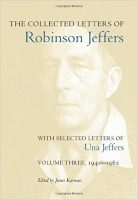
This volume of correspondence, the last in a three-volume edition, spans a pivotal moment in American history: the mid-twentieth century, from the beginning of World War II, through the years of rebuilding and uneasy peace that followed, to the election of President John F. Kennedy. Robinson Jeffers published four important books during this period—Be Angry at the Sun (1941), Medea (1946), The Double Axe (1948), and Hungerfield (1954). He also faced changes to his hometown village of Carmel, experienced the rewards of being a successful dramatist in the United States and abroad, and endured the loss of his wife Una. Jeffers' letters, and those of Una written in the decade prior to her death, offer a vivid chronicle of the life and times of a singular and visionary poet.
The End of the Alphabet by Claudia Rankine
[Paperback] Grove Press, 128 pp., $16.00
With a new introduction by Calvin Bedient
Claudia Rankine’s second poetry collection, The End of the Alphabet, is an inquiry into despair and recovery, selfhood and alienation. Centered on a heroine named Jane, these poems—obsessive, intrepid, erotic—speak in the aftermath of a life-altering tragedy, attempting to make peace with loss and find redemption through mourning. Rankine writes with unflinching attention to exterior detail and emotional nuance, as well as with linguistic and formal innovation, crafting an extraordinarily powerful, utterly unique portrait of sorrow and strength.
Traces of Time by Lucio Mariani
[Paperback] Open Letter, 130 pp., $14.95
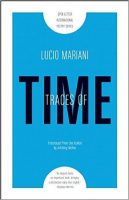
Culled from his entire career, the poems in Traces of Time cover numerous themes, most prominently the poet's relationship to history and how poetry can exist outside of it. "Tiananmen, 20 Years Later," "Protocols of War," and "Checkmate" (about 9/11) all illustrate Lucio Mariani's concerns "through images both dense and porous, lines both cadenced and spasmodic," and confirm his place in contemporary poetry.
Priscilla Long’s work begs to be read aloud in order to savor the rich language and rhythm she instills in each poem.
Correspondences
A Nation's Poet: Billy Collins
by Jack Sullivan

Unlike most, who no longer fall victim to scrupulous grading after graduation, Mr. Collins regularly submits his work to his close friend, trusted advisor and fellow poet George Green. The men will pass about 60 poems between them every two years—it’s the length of time it takes Mr. Collins to finish a book of poetry, including one he will read from on Sunday at Guild Hall in East Hampton—and no matter what, each is returned to the author with a letter grade.
In Conversation with Paul Muldoon
by Adam Crothers
This conversation with Paul Muldoon took place on a crisp morning in January 2015, shortly after the publication of his collection One Thousand Things Worth Knowing. He was in Cambridge to deliver the Clark Lectures on ‘Yeats and the Afterlife’; we spoke for an hour at Trinity College, in a spartan guest room livened by a few books and, on the coffee table between us, a fuchsia orchid.
Che Guevara’s Son on Cuba’s Coming Identity Crisis
When Omar Perez was 25, he found out his father was the revolutionary Che Guevara. For Perez — a poet, artist and musician — the revelation didn’t much change his outlook on life, or on Cuba. Jeffrey Brown talks to Perez in Havana about the Cuban Revolution, art and how closer ties with America may change his country.
A Conversation with Writer and Poet Sandra Beasley
by Abriana Jetté
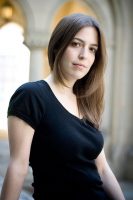
Winner of a 2015 Literature Fellowship from the National Endowment for the Arts, a 2009 Barnard Women Poets Prize for I Was the Jukebox, Sandra Beasley is an American nonfiction writer and poet. She has held positions of Writer-in-Residence for Lenoir-Rhyne University in Hickory, North Carolina, as well as the fall Distinguished Writer in residence at Cornell College in Mount Vernon, Iowa. Beasley has served as the 2011 Poet-in-Residence for Maryland's Howard County Poetry and Literature Society. Currently residing in Washington, D.C., Beasley coordinates events for the Art Club in Washington and teaches with the University of Tampa's low-residency M.F.A. program. Her work has appeared in The New York Times, The Washington Post Magazine, Oxford American, and The Wall Street Journal. Her memoir, Don't Kill the Birthday Girl: Tales From an Allergic Life, a cultural history of food allergy, was published in 2011.
Billy Collins regularly submits his work to his close friend George Green and no matter what, each poem is returned with a letter grade.
Envoi: Editor’s Notes
Lessons from the Past: Robert Hass
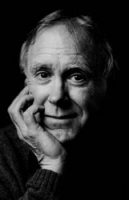
I haven’t arrived for myself at any very satisfactory formulation of what a prose poem is. Certainly it has something to do with condensation . . . I don’t know how to define it in terms of genre, and when I was working, I guess I just stopped trying to think about that. What I did think about was what the conventions of the prose poem were. At the time that I was starting to write them, the prose poem, as it had been revived in America, was used almost entirely for a kind of wacky surrealist work, and I think that nervousness about using prose was that then you had to put a lot of what people thought was poetic—that is to say, wildness and imagination and free association—into it to make sure that it was poetry, because if it got too near the conventions and sentence sounds of expository prose or narrative prose . . . then it really wasn’t poetry. So almost as soon as I started working, I got interested in those boundaries: what the prose poem wasn’t supposed to sound like . . .
It almost seemed like photography to me, and it gave me a feeling that I wanted to experiment with the form . . . I wrote a whole lot of them, and I got interested in textures, the way that you would with a given palette . . . I felt excited because I knew it [a particular prose poem, "Churchyard"] was exactly what the prose poem wasn’t supposed to be. It was too much like the sound of expository prose. . .
Later, something else occurred to me: I was working in these forms because they had a certain outwardness that verse didn’t have. I think I was at a time . . . when things were going on in my life that I didn’t want to look at, didn’t want to feel. And I wanted to keep writing, so I unconsciously started writing prose to avoid the stricter demands of incantation. When I was doing it, it seemed to be exploratory; in retrospect, it seems a sort of long escape . . .
—from an interview by The Iowa Review, 1991 (via Modern American Poetry website)
“The prose poem, as it had been revived in America, was used almost entirely for a kind of wacky surrealist work…” – Robert Hass